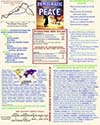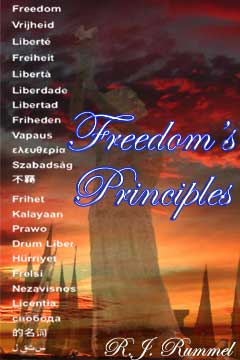
Note that the zero wars for democracies versus democraices continues from 1991 to 2009
Before the election of Barack Obama, much was written about the democratic peace, pro and con. Presidents Bill Clinton and George W. Bush based their foreign policies on it—as one of its pillars for Clinton, and as the core of Bush’s policy. But now, you hear almost nothing of it. In this and in subsequent blogs, I will try to determine what has happened to the democratic peace.
First, what is the democratic peace? There are the narrow and broad versions. The narrow one, being most well known and researched, simply says that democracies have never made war on each other (see above table). This is the most scholarly and scientifically researched idea of international relations, and as a result many students of the field now consider it a political law of the international system. Therefore, promoting democracy in the world is a way to peace, which Bush and Secretary Rice said many times.
The broad version includes the narrow and adds that democracies have the least internal violence and almost no domestic democide. Thus, by fostering human security, democracies serve as a way to peace and human betterment. There is also much research on this version, although discussants of the democratic peace usually have the narrow one in mind.
What are my sources for this? I have two bibliographies of democratic peace research and commentary, one for those published before 2000, and the other, just completed, 2000 and after. My interest is in the latter, since this will help answer the question about the current status of the democratic peace. To those to whom the democratic peace is an extraordinary idea, and in terms of peace, an unbelievable, idealist one, the earlier bibliography will be very useful. It presents the birth, replication, and early attempts to falsify the idea. Moreover, see my Democratic Peace Blog, which includes many analyses of the studies listed in this bibliography.
On balance, the bibliographies show that despite the negative critiques, attempts to falsify it, and assertions about negative cases, the democratic peace still provides a well researched and verified solution to war, democide, domestic violence, and human insecurity.
In Part II on the democratic peace, I will treat the idea within a foreign policy framework (such as Obama’s). The death of this solution to war and human security then will be easier to understand.















On the front page of your chart on the democratic peace, you say that Finland converted to authoritarian government during the Continuation War. What is the basis for this? Where did you read it? I understand that elections were postponed in Finland during this period, but then they were in Britain as well. From what I understand, Finland's democratic tradition survived the war with the minimal disruption that could've been expected in the circumstances.
ReplyDeleteWinston Churchill himself order Fleet Air Arm to bomb Petsamo in Finland in late July 1941. I believe this constitutes a war between two democracies.
I do not find a reference to Finland in this post or the footnotes to the table. Will answer your comment anyway. True, Finland was an ally of Germany during WWII, but no military action took place between Finland and Britain during the war. To be a war between two countries or military action, by definition nationals of the countries must be killed in combat. Britain did hit a camp under German operation in Northern Finland, but no Finns were attacked or died.
ReplyDeleteDuring the war the Finnish government did more than just temporarily cancel democratic elections. It turned authoritarian in spirit, favored the Nazis, and arrested leaders of the opposition and held them in a secret prison.
The question of Finland where two democracies were formally at war has been seriously studied by students of the democratic peace. Their conclusion is overwhelmingly that this is not a negative or disconfirming case. See for example, James Lee Ray, Democracy and International Conflict, pp. 119-120. and Spencer R. Weart, Never at War, p. 313. Weart also deals with the question of Finland's authoritarianism during the war.
Mr. Rummel, I thank you for responding so quickly. The reason why I raised the issue of the Continuation War was that I considered it a case of war between two democracies.
ReplyDeleteI'll look up the sources that you've mentioned and consider whether my view should be changed.
Britain did formally declare war on Finland on 6th December 1941, and most of its Dominions followed suit shortly afterwards. There is a scruffy page as regards the bombing of Petsamo here http://www.fleetairarmarchive.net/RollofHonour/Battlehonour_crewlists/Petsamo_Kirkenes_1941.html
What about Russia against Georgia in August 2008? I realize both countries are not model democracies, but still their leaders (Medwedew/Putin and Saakashvili) are popular and were elected democratically in their countries.
ReplyDeleteDuring World War II, The Soviets were at war with Germany and her ally Finland. Also, the Soviets were allied with Britain, and therefore pressured Britain, already at war with Germany, to declare war on Finland. She did so, but it was only a paper declaration. No military action between Finland's military and Britain took place.
ReplyDeleteRussia was then and is now neither a liberal or electoral democracy. It is rulled by one-party, its elections are a sham, and there is little freedom of speech. It would be classified at a semitotalitarian or authoritarian state. So, no war took place between democracies.
ReplyDeleteI've read the James Lee Ray. It seems agreed upon that Britain never attached any Finns directly. I am still concerned about the significant support we gave to the Soviet troops who were killing Finns and our insistence that Finnish PM Risto Ryti be put in prison after the war. There is now a statue to this man in Finland: they consider his imprisonment to have been a tragic concession.
ReplyDeleteI have not read the Weart: it's not available online, nor is it available at any of my local libraries or book shops. I'll try to track down a copy. From my other reading around the subject, I understand that Finland allowed Nazi Germany to use its land and extradited German refugees to Hitler. However, Finland never rounded up its Jews or Slavs to send to concentration camps. I have found nothing yet about the Finnish government's arresting opposition figures. When I read Weart, I'll compare his description of this with how my country acted during the war: Britain interned fascists, communists, and those of German and/or Italian descent during this period.
On a different subject, has there been any analysis of the Kargil War 1999? I know virtually nothing about this conflict, but didn't it happen when Pakistan had an elected government? I'd be interested to see what you think of that one.
The Kargil War was fought between India and Pakistan in May-June 1999. Pakistan claims 357 dead, but maybe 4,000. India had 527 dead. The cause was the violation of their accepted border by Pakistan soldiers and Kashmir terrorists (militants). At the time India was a democracy, while Pakistan was a borderline electoral democracy, rated by Freedom House as a partly free 4 on political rights and 5 on civil liberties to India's 2 and 3. Liberal democracies rate 1 or 2, North Korea 7 and 7.
ReplyDeleteMoreover, war is often defined as any military action causing 1,000 dead. Thus this was a most marginal war between one democracy, and one questionable. This hardly falsifies the proposition that democracies do not make war on each, as would a major war between two liberal democracies, like Canada and the United States.
Thank you for your response. That's interesting.
ReplyDeleteDo you always use Freedom House as your authority for defining a "democracy", or do you use other groups? I'd imagine that the Polity IV scales may be useful, as they go back further in time than Freedom House's ratings. http://www.systemicpeace.org/polity/polity4.htm Pakistan was just above their democracy line when the Kargil War occurred, so the result is quite similar in this case.
I know how carefully Freedom House evaluates the level of political rights and civil liberties for each nation. I have also studies the Polity coding system and do not like it. I think it wrongly codes authoritarian and totalitarian states by giving higher values to nations the have elections. Thus, the Soviet Union, which had periodic sham elections is coded more democratic than Saudi Arabia, with no elections. This kind of miscoding is systematic, and thus I do not trust the resulting scores. I have told them about this, but no changes have been made. But there are others that have used the Polity data to test the democratic peace proposition, with the same results I get for Freedom House.
ReplyDelete